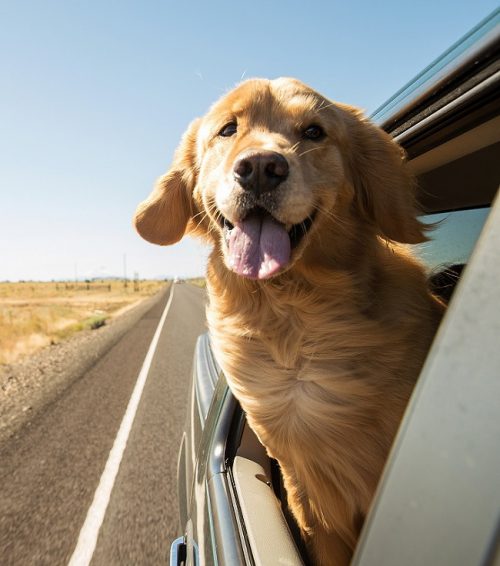
Barton Associates strives to make the travel process smooth and headache-free, helping in any way we can to help our physicians and advanced practice providers feel at home on assignment. For some, this includes bringing loved ones – including cats, dogs, rabbits, and other pets.
If you’re considering bringing your four-legged friend on your locum tenens assignment, bring it up with your Barton recruiter so we can guarantee pet-friendly accommodations and even pet-friendly assignments, taking into consideration your pet and their unique needs. Our travel associates are well-versed in the most pet-friendly hotel options, what types of pets are allowed, and potential fees, whether it’s a flat or daily rate throughout your stay.
Whether you’re planning on driving, flying or taking a train, it’s not uncommon to travel with pets in 2019. Once we arrange your pet-friendly accommodations, your next step is to confirm with your chosen airline, train, or rental company for their specific policy regarding animals, and get to work!
Traveling by Plane
As far as air travel is concerned, the Federal Aviation Administration (FAA) has left it up to individual airline companies to determine if non-service animals can be allowed in the cabin. Some flights allow all types and sizes of pets, while some are restricted. Some pets are allowed in the cabin, while others must travel below in the cargo area. If your pet cannot travel in the main passenger cabin, choose an airline with temperature controlled cargo (so your pet won’t be too hot or cold!) and choose a non-stop, direct flight.
Most likely, your pet will essentially need their own “ticket” – a fee which varies by airline. Oftentimes, there is a limit on the number of pets allowed on any given flight. Each airline has its own policy, which can be easily found on their respective websites or by calling their customer service line. Our Barton staffing specialists are always more than happy to help you find the answer, so don’t be afraid to ask! Barton Travel Associate Lauren S. offered this advice:
Once you have your flight nailed down, there are a few things you should gather before takeoff. According to BringFido.com, the United States Department of Agriculture (USDA) requires that the animal traveling has a rabies immunization and valid health certificate issued by a licensed veterinarian within 30 days of travel. It is also important to have an approved animal carrier with ID tags, no matter what the size of the pet is.
Traveling by Car
If you definitely don’t want to fly to your assignment, you’re only limited to places accessible by car (sorry, Hawaii) and how long you’re willing to drive. Together with your recruiter, you’ll be able to decide between taking your own personal vehicle, or if a rental car can be arranged for your travel assignment and what additional policies might apply with a pet onboard.
When planning your route, remember to take lots of stops for exercise and restroom breaks. To avoid motion sickness, your pet should not be fed in a moving vehicle, so rest breaks are a perfect time for a snack. Although you’ve heard this advice countless times, it still holds true: never leave them alone, whether outside or in the car. Pets are at risk of being stolen, exploring on their own and getting lost, or facing health issues due to extreme temperatures.
Before heading out on your road trip, look into pet-friendly restaurants, rest stops, parks, and campgrounds along your route and in your assigned location. It is also good advice to look into emergency veterinary clinics and, if needed during a long-term assignment, a regular veterinarian to visit while you’re on assignment.
The Stress of Travel
Traveling can be stressful for you – but also for your pets! You know your pet best: will travel be stressful or fun? How have they handled travel before? What’s their personality like with new people? Will they be bored, irritable, or destructive if left alone?
Taking your pet on your locum tenens assignment is not recommended with elderly pets or pets new to you, such as puppies who need to be trained first before being introduced to new sights, sounds, places and people.
If your assignment doesn’t allow for much free time to spend time with your animal, maybe it’s best to keep them at home. They’ll be happier for it! Let them stay with a trusted friend, your family, or their favorite boarding service while you’re away on assignment.
Final Thoughts
Traveling with your four-legged family member doesn’t have to be a hassle. Similar to traveling with your family, a little research and communication will make your locum tenens travel more accommodating for both you and your pet. Depending on the length of your assignment and schedule, coming home from your shift to see a friendly face greeting you will make you feel more at home in an unfamiliar location and make traveling with them all the more worthwhile.
After you’ve checked with your Barton team and your chosen travel companies’ (airline, rental car, hotel, etc.) policies for traveling with pets, don’t forget other necessities like their leash, favorite toy, carrier or crate, vaccination records and medications, treats and extra food, water bowl, and their collar with up-to-date contact tags. Your vet can also be a resource to give you breed-specific advice for travel.
Pets are like family, so make them part of your decision – not a deal-breaker. There’s some navigating to be done, but with a Barton teammate, it’s possible.
